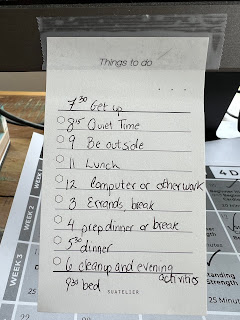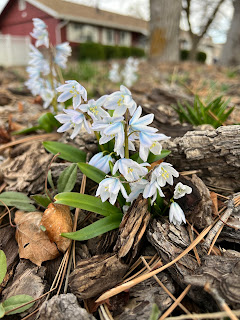After four solid weeks of writing about burnout, I thought I was done. This was clearly a very silly notion - burnout (and stress management to prevent burnout) has played a profound role in my life. I keep learning more and then I get so excited that I just have to share it with you. So, let's keep working with burnout!
In Emily Nagowski's Burnout, she draws a careful line between the effects of stress and the effects of stressors. Stressors are the things that cause us stress - an impending deadline, friction at home, fear of underperforming, etc. We spend a lot of time and attention on our stressors; these are the problems we seek to solve.
We also need to pay attention to the stress itself. The why is locked deep inside our evolutionary history: way back when our stress skills developed, stressors almost always required a physical response. The wolf was attacking us and our stress response got our bodies ready for the big expenditure of energy needed to run or fight (the sweating, clammy hands, pounding heart, dilated pupils, etc). Stress got us ready for big movements, big responses, fighting or fleeing.
However, in the present day, the story becomes more complicated because our stressors are usually not things we need to physically fight or run from - they don't require physical exertion. We don't get to stand up and punch a deadline in the face or flee it by running as fast as we can back to our village. Yet our bodies still rev up the same way that they did when we were running from wolves.
It turns out that dealing with the stressor isn't enough to discharge the stress. We all experience some version of this - we made it through the performance review, yet we still feel anxious and agitated. We have to work through the physical stress just like we had to work through the mental and emotional work of processing the stressor. We must discharge the stress that's stored in our bodies - simply removing the stressor isn’t enough.
What do our bodies need in order to process stress? Here are a few options:
- Exercise, especially with more intense intervals
- Breathing mindfully
- Progressive relaxation exercises, tensing and releasing different parts of the body
- Positive social interaction, even just exhanging niceties with your barista
- Expressing and receiving affection
- Crying (yes, a good cry is cathartic!)
- Expressing yourself through creativity
The stress doesn't automatically go away just because the stressor is gone. Our bodies need to process stress just like our minds need to process the stressors. Engaging in these activities consistently will help gradually release the body's stored stress. And, eventually, the anxiety that came with the stress will also be released.
For me, I think this is a reason I enjoy mountain biking so much - not only am I outside in nature's beauty, but there are tough moments that get my heart pounding when I can almost feel the stress working its way through and out of my body. What releases stress for you? What do you notice when you work to process the physical stress in your body in addition to working through the stressors?


































